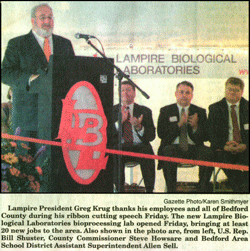
by Karen Smithmyer - Bedford Gazette
EVERETT — Friday was a special day for Lampire and its employees. Not only did the company mark its 30th anniversary, they also cut the ribbon on their new 18,000 square foot bioprocessing laboratory.
Lampire Biological Laboratories, located within the Everett Business Park along Route 26, is an international supplier of biological reagents in the life science industry. Started in 1977 by Greg Krug and Craig Tarler, Lampire first moved to Bedford County in 1989 with a 125-acre farm south of Everett with three employees. Today, that farm has expanded to 400-acres and 30 employees. According to President Krug, Bedford County has given his company more than he imagined it ever could. “We came to Bedford County looking for farmland and an agricultural workforce. We found an exceptional workforce and a supportive economic development climate that has encouraged us to expand operations here in Bedford County,” Krug said. Although many people saw the ceremony as a celebration for Krug, he disagreed.
"Today is not a Greg day, it's really about all the people who work here and everyone who made Lampire happen in Bedford County."
"It's all about you guys," Krug said.
"The $2 million bioprocessing lab is a way to bring more jobs to the county," he said. Currently Lampire employs 120 professionals, 50 of them in the county. That number is expected to expand to 70 by early 2008, Krug said.
One of the founders of Lampire, Tarler, said Krug is more of an entrepreneur than a businessman. "There are two meanings of entrepreneur: the first only cares about fast expansion and making money. The second cares about the community and the environment in which they work. Greg is the second. He cares more about his workers and the community than he cares about making money," said Tarler, president of Cornell and Diehl, Inc.
More than 200 people attended the ribbon cutting and anniversary celebration, including local, state and federal officials.
James Greenwood, president and CEO of the Biotechnology Industry Organization from Washington D.C., said Bedford County should be proud of itself. "We have conferences every year with companies from all over the world trying to convince people to set up biotechnology centers in their communities. Bedford County won," Greenwood said.
He related biotechnology labs as people trying to create a world free of disease, hunger and pollution. "Really, these people here are trying to create a world for their children."
Not only does Lampire's presence in Bedford County increase jobs, it also increases awareness for many high school students.
Bedford Area School District Assistant Superintendent Allen Sell said Lampire is responsible for developing agriscience in area schools. "Agriscience enables students to work in the bioscience field, and the connection between agriculture and Lampire's biotech was a perfect match," Sell said. He helped to form the new agriculture-biotech curriculum as director of the Bedford County Technical Center last year.
Krug said he never saw a growth this large for his company 30 years ago. "It's been an exciting and emotional 30 years and I've been fortunate enough to sit on the top."
"We've had a run like you wouldn't believe, thanks in part to all the support Bedford County has given us over the years," Krug said. Bedford County boasts nearly 50 percent of all Lampire employees, with that number expected to increase early next year.
Along with a ribbon cutting ceremony, attendants had the chance to tour the new laboratory. Vice President of Technical Development Alan McNally explained in general terms all the different labs Lampire has. The easiest way to explain what Lampire does, he said, is to compare it to giving vaccines to babies. "We develop different antigens from animals that can be used to combat and cure diseases," McNally said.
He also said the new lab will provide a one-stop shopping center for clients. Instead of taking the antibodies and shipping them to different labs for research, everything can be done at the new biotech lab. Antibodies are proteins found in blood or other bodily fluids, and are used by the immune system to identify and neutralize foreign objects, such as bacteria and viruses. Through this research, scientists can formulate vaccines and other methods of combating disease.
The new building features centrifuge labs, which separate materials into different components, sterilization labs, which are used to purify and sterilize the air when specific products are grown; and di-filtration labs, which take something from one state and change it to a new state.
The centrifuge labs are important, McNally said, because they allow scientists to break down materials so specific components can be used for an experiment. "Here, we take out what the client wants, usually serum or plasma, and can transfer it to the next lab. Sterilization labs are vital for producing a lock and key system," he said. "In here, we are able to produce one specific "key" that can be used in the body to "unlock" an antibody or something else. In the body certain bacteria and things only work with one other thing; here we're producing that other thing," McNally said. This lock and key process is used often in biotechnology, McNally said, although most people just aren't aware of it. "Many people don't really know what we do in biotechnology, but an easy example is the lock and key system." "It works exactly the same way a pregnancy test works. You have a "key" that tries to detect a "lock". If there's a lock present, then you're pregnant."
The $2 million bioprocessing laboratory was partially funded through the state and federally supported financing. It sits on five acres and is part of the Keystone Innovation Zone, which provides tax incentives to companies under 8 years old.
According to Krug, Lampire has invested $8 million in the Bedford County lab.
"The Bedford County workforce is a powerful group and I'm so glad to be a part of the community," he said.